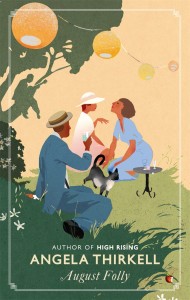 Published by Virago 1 May 2014
Published by Virago 1 May 2014
288pp, paperback, £8.99
Reviewed by Elizabeth Hilliard Selka
Some things never change. Young people don’t want to discuss how their exams went (badly), are embarrassed and irritated by their parents and wish they were the sort who ‘could be relied upon to go out and leave the house clear, besides providing plenty of drinks’ when you want to give a party. On the other hand, some things have gone for ever, such as the ‘up’ train (London is always ‘up’, wherever you are geographically) and the ‘down’ train, either of which can be held waiting while you run home for a forgotten parcel, and the village am-dram production of such as Euripedes’ Hippolytus – today it’s more likely to be a bedroom farce.
This is 1920s Barsetshire (the invented county is borrowed by Thirkell from Trollope) where villages are called Worsted, Winter Overcoats, Shearings, Fleece and, best of all, Winter Underclose. You’ll need the latter – this is a world of no central heating and few other creature comforts. The Tebbens’ cook, for example, routinely produces meals that are almost too disgusting to consume. It’s a between-the-wars world which we can look back on with amused nostalgia – and relief.
Richard Tebben and his younger sister Margaret are home for the summer, with no plans for the future. He’s a self-engrossed youth just down from Oxford, she’s back from being ‘finished’ on the Continent. Their impoverished, scholarly parents occupy a too-small house while nearby live landed, childless Mr and Mrs Palmer and for August at least, his sister, the fragrant Rachel Dean, and six of the Deans’ nine children. The eldest of these is of comparable age to the Tebbens. The scene is set for witty banter and authorial observation, hilarious pomposity, jollity, japes, misunderstandings, reconciliations and romance. It’s engaging and delightful, perfect summer reading…
August Folly was published in 1936, the third of Angela Thirkell’s comic novels, of which, by her death in 1961, there were 29 and a half. She took her Barsetshire characters through the war and out the other side into the 1950s, and also wrote other novels, children’s books and autobiography. She was prolific and well-known. Ask a literate octegenarian today and they’ll say, ‘Oh yes, Angela Thirkell!’ Born in 1890, she lived a colourful life, through both world wars, two marriages, and life and motherhood in 1920s Australia from which she fled back to London in 1929. Hers was a cultured, literary circle – her grandfather was Edward Burne-Jones and her cousins Rudyard Kipling and Stanley Baldwin. She is reputed to have borrowed the money for her fare from Australia from her godfather JM Barrie. Writing popular fiction was her way of earning an income in a world in which women of her sort did not have jobs.
Thirkell was back in print in the 1990s but has been boosted by Virago’s current reissues. It’s a clever move: Angela Thirkell’s world is now far enough off for a rare racist reference (not however in August Folly) and sexist presumptions to be taken as either ironic, or accurate reflections of the novels’ period, or offering insight into the limitations of an individual character. What sings out is the ebullience and charm of her characters, deliciously sparkling dialogue, a romping plot, her wit and gentle satire, and the escapist satisfaction of neatly tied-up happy endings. This is not high literature, but it is none the less admirable and enjoyable for all that.
